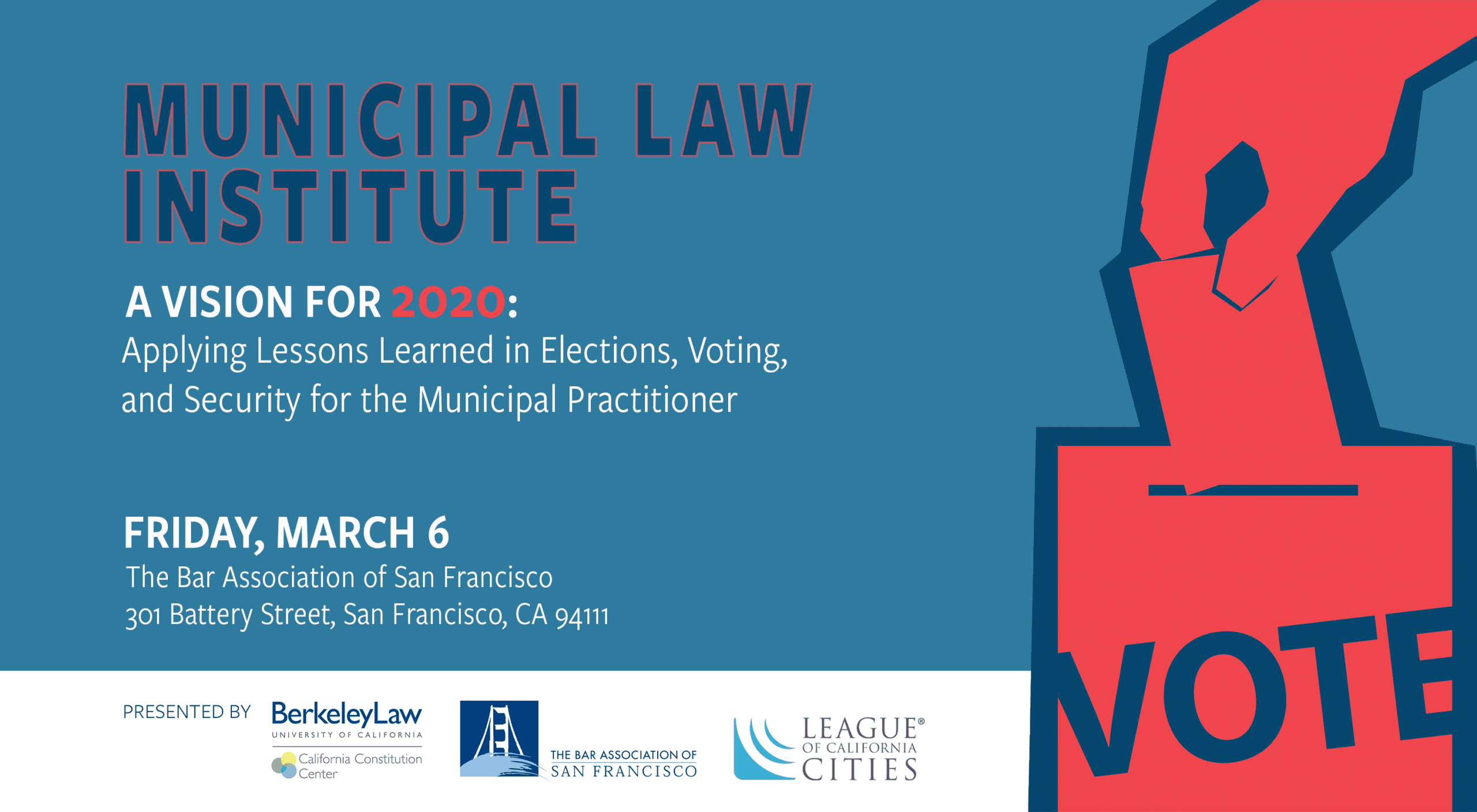
CLICK HERE TO REGISTER
March 6, 2020
9:00 a.m. – 4:15 p.m.
The Bar Association of San Francisco
301 Battery Street, San Francisco, CA 94111
8:30-9:00 Registration
9:00-9:15 Welcome/Opening Remarks
9:15-10:15 The Impact of California Cannabis Coalition v. City of Upland on Tax Initiatives
In 2017, the California Supreme Court issued a 5-2 decision in City of Upland expressing a decision on a narrow issue, that local measures introduced by voter initiative were not required to be presented in a general election, but could be presented in a special election instead. This panel will discuss this decision which sparked a greater debate about whether local tax initiatives are subject to a two-thirds supermajority vote as required under the California Constitution.
Rob Ewing and Darren C. Ziegler (moderators), David A. Carrillo, Executive Director, California Constitution Center, Berkeley Law, Scott Reiber, Chief Tax Attorney, City and County of San Francisco, Wayne Snodgrass, Deputy City Attorney, City and County of San Francisco
Download panel materials: UC Regents Muni taxes City of Upland 51-U.C.-Davis-L.-Rev.-65 City of Upland bios City of Upland CA-Cannabis-Coalition-Memo-1
10:15-10:30 Break
10:30-12:00 Voting Rights Litigation and Strategy
In 2001, the California legislature enacted the California Voting Rights Act, an expansion of the federal Voting Rights Act, providing a right of action by racial minorities who allege dilution of their vote in at-large municipal electoral systems. Since then, local jurisdictions have encountered litigation and significant exposure to costs and fees associated with settling and defending voting rights lawsuits. This session will address current trends in litigation and real-world strategy and war stories involving litigation involving the California Voting Rights Act and federal voting rights cases involving equal protection.
Anais Martinez Aquino and Dion O’Connell (moderators), Harit Trivedi, Deputy City Attorney, Los Angeles City Attorney’s Office, Robin Johansen, Olson Remcho, George S. Cardona, Special Counsel/Chief of Staff, Santa Monica City Attorney’s Office
Download panel materials: Voting rights Cardona voting rights Lee v. LA City’s answering brief voting rights Santa Monica v. Pico City’s opening brief voting rights Santa Monica v. Pico League of Cities amicus voting rights Cardona.bio voting rights Trivedi bio Johansen and Willis Bios voting rights 908_F.3d_1175 voting rights — City Boundaries Map voting rights — City Boundaries Map Full voting rights CD10 Changes Explained voting rights — HUT PowerPoint PDF
12:00-1:00 Lunch/Keynote Address
Erwin Chemerinsky, Dean, Berkeley Law
Jesse H. Choper Distinguished Professor of Law
1:15-2:45 Redistricting After 2020 Census
Following completion of the 2020 census, California will review and adjust district boundaries. AB 849 makes significant changes to the process that cities which elect their council by districts will need to follow. This presentation will discuss newly enacted legislation, AB 849, that completely revamps the rules of redistricting—both substantive and procedural—for cities and counties.
John Abaci, Nubia Goldstein, Isaac Rosen (moderators), Chris Skinnell, Nielsen Merksamer Parrinello Gross & Leoni, Sean Welch, Nielsen Merksamer Parrinello Gross & Leoni, Douglas Johnson, National Demographics Corporation
Download panel materials: redistricting Welch bio redistricting Skinnell bio redistricting Johnson Bio redistricting Municipal Redistricting Presentation redistricting presentation redistricting Legal Criteria Summary Document redistricting AB 849
2:45-3:00 Break
3:00-4:15 Elections Security
In 2002, the Department of Homeland Security (DHS) was granted responsibility for promoting the security and resilience of “critical infrastructure” (systems that if incapacitated would have a debilitating impact on national security), but not regulatory authority over “election infrastructure” (e.g., polling places, voter registration databases, voting systems, etc.). The federal Election Assistance Commission (EAC), created by the Help America Vote Act (HAVA), has provided a broad range of assistance to states in implementing HAVA requirements, and researching issues in election administration. Following the series of cyber attacks during the 2016 election, DHS designated the election infrastructure used in federal elections as a component of U.S. critical infrastructure. Although conducting elections is solely the responsibility of states and localities, this session will explore the status of election security efforts and challenges facing federal, state and local election officials.
Moderators: Sandra Lee and Dion O’Connell (moderators), Susan Lapsley, Deputy Secretary of State and Counsel for Secretary of State Alex Padilla, Dr. Barbara Simons, Board of Advisors, U.S. Election Assistance Commission and Board Chair of Verified Voting, Timothy Perry, Chief of Staff, Governor’s Office of Emergency Services, Chris Reidel, Supervisory Protective Security Advisor, CISA Region IX